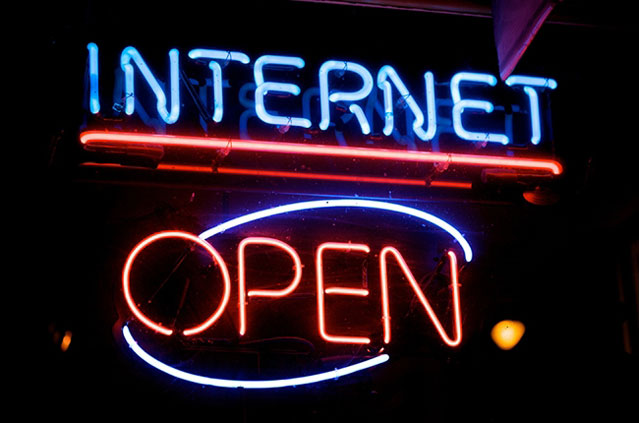
Net Neutrality, Technology, and the Democratization of Knowledge
Net neutrality is the issue at the center of debate over the fate of the Internet. Tech giants like Facebook and Netflix are battling with service providers like Comcast and Verizon over “fair use” of that precious Internet resource: bandwidth.
It’s easy to forget that the Internet wasn’t always congested with millions of kitten videos and other bandwidth-hungry forms of streaming entertainment, and at one point it’s main usage was actually for sharing information.
The “Information” Superhighway
The early days of the Internet touted it as the “Information Superhighway”. The general idea was that as the internet became more available to everyone, the dissemination of resources would become more equal.
If a person lacked physical access to a library or university due to location or income, the Internet would provide them the ability to virtually visit a repository of information to research and learn from a distance. For schools in poverty stricken neighborhoods, an internet connection allowed teachers the ability to bring otherwise unaffordable interactive experiences into the classroom.
At its best, the Internet was imagined to be a tool for communication, for sharing information and cultures, and for individuals from around the globe to join in a community of learning and discovery and to, perhaps, use this greater understanding to come together to solve long standing socio-economic problems.
The Internet of Fun
In hindsight, the exaggerated optimism of the early internet seems naïve and quaint. Following the dot-com crash of the late 90’s, the rise of the commercial web exemplified by Amazon, and the infiltration of social media as a primary means of cultural discourse, the idea that the Internet could be used for something more than advertising and branding, whether corporate or personal, seems archaic.
Rather than any singular community of polite, positive interaction, all too often the anonymity of web forums has given some individuals a platform for vitriolic tirades and otherwise socially unacceptable behavior. This study from researchers at the University of Manitoba shows how antisocial online behavior is related to personality traits.
The wide availability of information and research has also not faired particularly well. Multiple studies have shown that in place of wider intellectual opportunities allowing for a more informed citizenry and well reasoned debate, the internet has provided a public forum for demonstrably inaccurate pseudoscience and academics and a rejection of verifiable fact (see another example here).
Near ubiquitous high speed broadband access has made the Internet a fundamental part of American daily life. Online activities as diverse as email, Facebook, banking and paying bills, or purchasing anything and everything from plane tickets to clothes to real estate now take up a huge portion of our collective time.
Entertainment sites are especially notable for the amount of time users spend in viewing content. Some estimates place Netflix and YouTube as responsible for over half of all Internet bandwidth in use at any particular moment.
Easy, reliable access to entertainment on demand, and to social networks which allow friends and loved ones flung far afield to stay in close contact, seem to be relatively positive developments. Unfortunately, though all work and no play can lead to negative consequences, so can the reverse.
The Internet of Knowledge
When so much attention is focused on the fun, social aspects of the Internet, little thought is spared for recognizing this amazing tool can be used to improve the mind. This is abundantly clear when one views the results of the National Science Foundations basic science poll.
The results are fairly revolting, with over a third of adult Americans responding that the sun goes around the earth. (See the full report here)
The late U.S. Senator Moynihan was quoted “Everyone is entitled to his own opinion, but not his own facts.” The Internet, as a world wide tool, is and should be a relatively ungoverned public space wherein ideas and art can be disseminated and shared freely.
Nearly the sum total of human knowledge is accessible in some way, as well as vast amounts of arts and entertainment. Much of the store of scientific fact that has been catalogued represents the hard won life’s work of thousands of men and women the world over, beginning at the dawn of recorded history.
As a society we should honor their achievements by making sure that each individual has free and ready access, not just to the fun and games, but to the fundamental information as to how the universe, the world, and humans function. Ultimately, this will likely help us all to live together better.